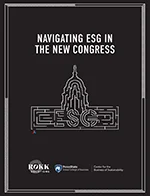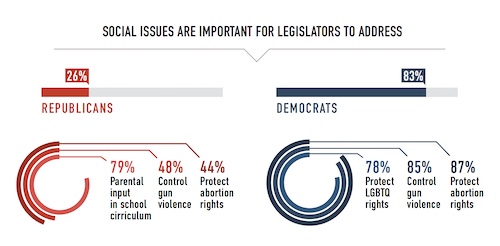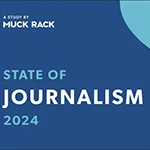 |
With many Republican legislators already threatening to rein in “corporate wokeism” in 2023, a new study from ROKK Solutions and Penn State University’s Center for the Business of Sustainability finds that neither Democratic nor Republican voters are behind efforts to curb ESG initiatives.
“Navigating ESG in the New Congress,” which surveyed 1,261 registered voters across the US this fall, found that more than three-quarters (76 percent) of respondents across the political spectrum agreed that “companies should be held accountable to make a positive impact on communities in which they operate.” Perhaps not unexpectedly, that number was considerably higher for Democrats (82 percent) than for Republicans (69 percent).
However, more than half (52 percent) of all respondents said they felt that “corporate wokeness” has gone too far. The general feeling was that they wanted companies “to be more focused on their products and services than on espousing support for ESG-related initiatives.”
 |
Only about a third (33 percent) said they supported an employer speaking out about social issues that are not related to that company’s business focus. That number rises to 47 percent for Democrats and falls sharply (to 20 percent) for Republicans. In addition, only 32 percent of Republican respondents said they wanted their employer to openly criticize legislation that goes against its stated values. Slightly more than half (52 percent) of Democrats were OK with an employer criticizing such legislation.
But a majority of respondents were against letting the government step in to curb a company’s “corporate wokeism.” More than six in 10 (63 percent) said that the government should not set limits on corporate ESG investments. Republicans (70 percent) were even more adamant than Democrats (57 percent) in this regard.
In addition, a majority of both Democrats (53 percent) and Republicans (57 percent) said that the government should not have oversight over companies that are “overly involved in social issues.”
Respondents were also asked what issues were top of mind for them. Not surprisingly, “pocketbook issues” (inflation, middle class taxes, health care and housing costs) topped the list, with 84 percent calling them a “top area of concern.” Such global issues as immigration, competition with China and the Ukraine-Russia war were cited by 71 percent.
When it comes to the environment and social issues, Democratic and Republican respondents were more strongly divided. For example, while 83 percent of Democrats said they thought climate change was a key issue, only 50 percent of Republicans agreed.
Defusing any potential legislative assault toward corporate ESG initiatives, the study concludes, is largely a matter of education and messaging. “Concerted corporate communications designed to educate stakeholders about how ESG strategies address key issues of importance for all stakeholders represent a good first step in this goal,” the study authors write.


 Employees at U.S. companies are experiencing high levels of burnout, but managers are lagging behind when it comes to their awareness of the problem
Employees at U.S. companies are experiencing high levels of burnout, but managers are lagging behind when it comes to their awareness of the problem Brand has a powerful effect on a company’s valuation, but the level of brand understanding in the investment community leaves a lot to be desired, according to a new study from Brodeur Partners, Interbrand and NewtonX.
Brand has a powerful effect on a company’s valuation, but the level of brand understanding in the investment community leaves a lot to be desired, according to a new study from Brodeur Partners, Interbrand and NewtonX. AI may still be viewed with a wary eye by most media pros, but its use is growing, according to a new study from Muck Rack.
AI may still be viewed with a wary eye by most media pros, but its use is growing, according to a new study from Muck Rack. A new study from Walker Sands says that some marketers have been putting the cart before the horse when it comes to the relationship between marketing channels and business outcomes.
A new study from Walker Sands says that some marketers have been putting the cart before the horse when it comes to the relationship between marketing channels and business outcomes. Thought leadership can make made B2B brands more "powerful and attractive to buyers," according to Edelman report.
Thought leadership can make made B2B brands more "powerful and attractive to buyers," according to Edelman report.


 Have a comment? Send it to
Have a comment? Send it to 
No comments have been submitted for this story yet.